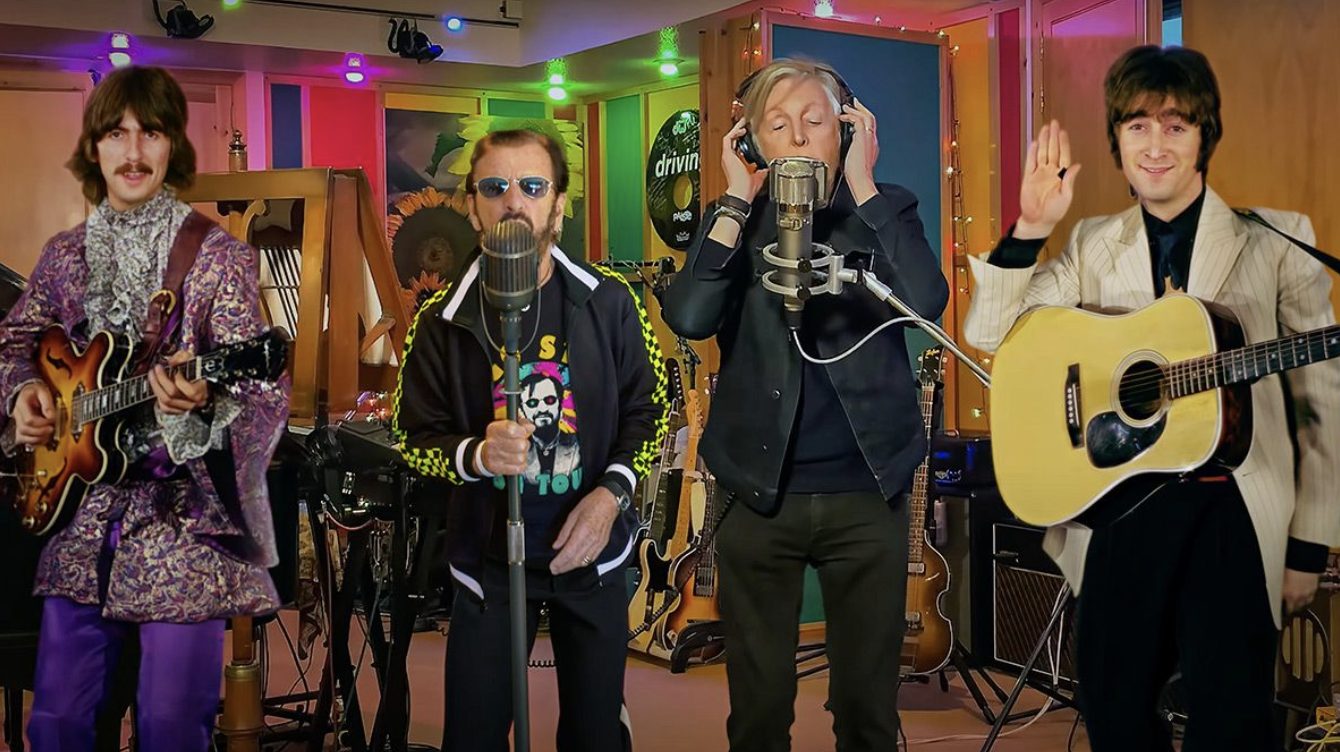In February 1994, George Harrison, Sir Paul McCartney and Sir Ringo Starr cracked open the Beatle songbook vaults, stumbling upon hundreds of unreleased demos and live performances.
Aided by ELO’s Jeff Lynne, the three remaining bandmates reunited to work on the legendary ‘Anthology’ compilation series, chronicling the bands legacy dating as far back as The Quarrymen days in late 1950s Liverpool, through to the band’s definitive closing ‘Let It Be’ days.
Amid the project’s production, Yoko Ono handed McCartney a set of cassette tapes, all possessing unreleased home demos recorded by Lennon in his final years, which none of the remaining Beatles had yet heard.
Harrison, McCartney and Starr agreed to take a stab at resurrecting the art of their former bandmate and closest friend and could now, thanks to advances in production and technology, re-record, finish and release two of the songs: ‘Free as a Bird’ and ‘Real Love,’ both of which shot to the top of the UK charts and generally received high praise and adoration from critics and Beatles fans alike.
The ‘Anthology’ project was – at least up until this point – unthinkable; it had been almost 15 years since Lennon died, 25 since The Beatles officially broke up and yet, here they were, releasing two ‘final’ songs.
There was, however, another song to be recorded from the cassette demos: Now and Then – an extremely personal, touching piano love ballad by John which the boys briefly attempted to re-record and produce with the Jeff Lynne treatment of the other demos before shelving the track due to the poor sound quality of the recording which George Harrison once described as “rubbish.”
On 25 October 2023, just shy of 30 years later, the remaining Beatles – now sadly only Paul and Ringo – announced ‘Now and Then’, set to be released on 2 November as a double A-side with the band’s first recorded single, the classic ‘Love Me Do.’
Upon the singles’ announcement, McCartney announced the track was created with the help of Artificial Intelligence or, more specifically, sound source separation technology which allows for the extraction of certain elements of the track to enhance the overall sound quality.
The Beatles’ use of AI on ‘Now and Then’ has created a genuine and long overdue defence of the software’s influence and usage in modern music, which has been overwhelmingly negatively reported on.
In May 2023, The Telegraph reported that Sir Lucian Grainge, chairman of Universal Music Group, raised concerns to the Chancellor of the Exchequer, Jeremy Hunt, over the rise of AI-generated music, stating the “widespread and lasting harm” the software will have to the industry.
Meanwhile, ‘Heart on My Sleeve’ – an AI-Generated song mimicking Drake and The Weeknd – obtained over 20 million streams and was even submitted for the Grammy awards, with people genuinely believing they were listening to an unreleased demo by the two artists, rather than an Artificially created track by TikTok user ghostwriter977.
Speaking of TikTok, the AI-generated music creations found throughout the app don’t do much to convince sceptics; Frank Sinatra singing Five Nights at Freddies, while extremely amusing, doesn’t demonstrate the software’s full potential.
That’s the problem with Artificial Intelligence’s influence on everything really; anyone with the right resources can create anything they wish to, and for music this is – with Gen-Z’s at least – often used to create made-for-TikTok fake demos and parody covers.
If ‘Now and Then’ shows anything, though, it’s that, if utilised correctly, AI can be a powerful tool in music.
The software permitted the extraction of the pure emotion and beauty of Lennon’s original demos and allowed them to be recorded in a way that was not before possible due to the audio quality.
Speaking to the BBC in June 2023, Paul McCartney confirmed that there was ‘nothing artificial’ about the new record.
Listening to Lennon’s vocals on what is the ‘final’ Beatles song is a magical moment; this would have not otherwise been possible without the use of AI and doesn’t make ‘Now and Then’ any less of a ‘real’ song.
The artistic possibilities that now exist due to Artificial Intelligence should create excitement amongst music fans.
When you strip AI – particularly sound source separation technology – to its barebones, what we have is groundbreaking, innovative new technology which allows for clearer, better sounding music.
Arguably, the software is of the same nature as sampling, which has been utilised by artists for years to great effect and is now seen as one of the staples in modern music production but was met with the same controversies and allegations of ‘unreal’ music.
AI does, however, come with the same challenges, limitations and potential exploits as sampling, and the concerns of artists and labels should not be ignored.
There does need to be clear regulations to protect musicians on what does and doesn’t clarify as ‘human-made music’ when it comes to the use of AI – The Beatles’ ‘Now and Then’ is very clearly a human made song, while The Weeknd and Drake-mimicking ‘Heart on My Sleeve,’ created by a random TikToker, is not; the two need to be clearly distinguished to protect the artistry of music.
With these protections, alongside genuine innovation and creativity from artists, Artificial Intelligence can be effectively utilised in the way seen on ‘Now and Then’; It’s now up to artists themselves to make the case for AI and prove there is a place for the software in music.
Featured image credit: Apple Corps

